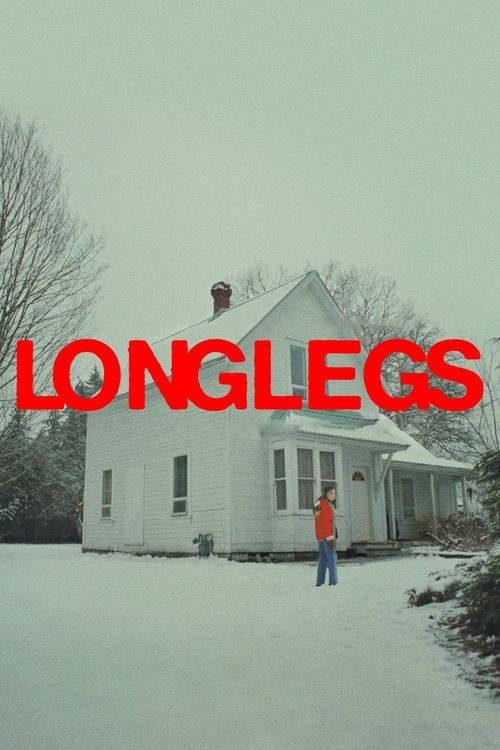We’re just 11 days away from the Mega Showdown Screenplay Contest. Details on how to enter are here!

The only time when the box office is interesting is when something unexpected happens and we had one of those unexpected moments this weekend when Longlegs shocked Hollywood by pulling in 22 million bucks.
What’s interesting about this is that Longlegs is what I call a “tweener.” It is in between genres. It’s technically a serial killer movie but it’s shot and treated like a horror film. I mean, check out this trailer. Tweeners are where screenwriters go to gamble. Because when you get them right, the rewards are huge. Everybody tells you, “Oh my god, it was genius to mix those two genres!”
But when you fail, you fail spectacularly. We saw that with another tweener movie that came out this weekend, Fly Me to the Moon, a film that did about as good (9.5 mil) as I expected it to when I reviewed the script two weeks ago. It’s part biopic part rom-com??? I’ve seen some questionable tweener combos before but this one is up there.
Getting back to Longlegs, it’s a vindicating moment for me because I remember reviewing Osgood Perkins’ script, February, so many years ago and finding it to be excellent. It’s a strange thing, screenwriting, when you know someone is an excellent writer but the results don’t prove it.
You wonder why so many other less talented writers have these giant credits instead. Hacks like Mattson Tomlin or massively overrated teacher’s pet Michael Waldron. Perkins is a way better writer than either of these guys so why are the coloring book professionals making a million bucks a script?
I suppose when you look closer, it makes sense. Perkins lives inside the burn. He lives inside the subtext. Whereas these other writers live inside the party. They live inside the bells and whistles. And those things get more attention. Especially when it comes to the types of movies that make the most money in Hollywood.
But Perkins has finally made a, “Studios take note” movie that will most certainly elevate him to high profile status.
This past week, I’ve been talking with writer friends, I’ve been working with writers as a consultant, I’ve been reading scripts for the site, and I’m even reading a book. A major theme emerged from all this reading and it’s the topic of TRUTH in writing.
There are so many times when I read something where a character will say something or do something that’s not truthful. In other words, whatever they’re saying or doing is not reflective of what one would say or do in real life. And the second that happens in a script, a little switch gets flipped in the reader’s head where they think, “That’s not realistic.”
Every time that switch gets flipped, the reader gets closer and closer to disengaging his suspension of disbelief. It doesn’t take many flips for the reader to give up entirely. It only takes 2 or 3 times depending on the degree to which the moment affects the story. In other words, if a character says something untruthful when he’s joking around with a friend, it doesn’t bother the reader much. But when a character says something untruthful during an important high stakes moment in the story? That could be the end of your script right there.
To understand this, you have to see suspension of disbelief as a balloon. And every time you lie to the reader, it’s the equivalent of throwing a sharp rock at that balloon. Maybe the balloon survives a few throws. But eventually it’s going to pop.
So what does a lie look like in writing?
Let’s start with a simple example. You’re writing a horror script. You have a babysitter in a house. Your plan for the scene is to get the killer inside the house because you need him to kill her. So you have your killer dress like an electricity guy and ring the doorbell. The babysitter comes to the door, the fake electricity guy says there’s an electricity problem on the block and he needs to check the basement. What does the babysitter do?
Does she let him in?
I have news for you. If your answer is yes, you just lied to the reader. You’re lying because the babysitter isn’t going to let a strange man into this house at 9pm at night. At the very least she would tell him to hold on and call the owners of the house to inform them about the man and let them make the decision. But if she just lets him in because he wants to come in, you are lying to the reader. Which is inexcusable.
Okay, let’s look at another example.
Your female hero has been handcuffed and thrown in the back of a cop car, which is on the move. We establish that the cops are dirty and it looks like they’re taking her somewhere to kill her. For context, this is a family woman who’s never been in a situation like this before.
Our hero, when the cops aren’t looking, reaches up, grabs a bobby pin out of her hair, and discreetly goes to work, using the bobby pin to open her handcuffs, and jump out of the moving car.
Would you write that scene?
If so, you have just lied to the reader.
The lie is that this character would a) know how to do this and b) be able to pull it off. Have you ever opened handcuffs with a hairpin? Would you know how to do it? If you don’t know how to do it, why would this character know? You may say, “But that always happens in movies, Carson!” That’s literally the worst response you can use for justifying an action in your script.
“All those sh#tty movies did it Carson. Why can’t I?”
If you want to model your script off a terrible movie, go ahead. But I promise you that’s not going to help you when somebody reads it.
 “I wanna go home!”
“I wanna go home!”
One of the reasons that The Acolyte has completely fallen apart as a show is because it lies so much. Keep in mind, the audience isn’t aware that this is the reason they’ve lost faith in the show. All they know is they don’t like it. But the writer lying to them so much is the primary reason they don’t like it.
In this most recent episode, we go back in time when the twin girls, Maye and Osha, were still with the witch clan. The purpose of the episode is to show us why Master Sol came after and adopted Osha. It’s a big deal for a man to take a kid from her mothers so it has to be a major reason.
What ended up being the reason? He saw Maye and Osha playing in the forest and got a sixth sense that they were being taught an “incorrect” way of living. Not that they were in danger, mind you. Just that he didn’t like the way he assumed they were being raised.
That’s a lie.
That’s a bold-faced writer lie.
The writers needed to get Master Sol to the witch clan so they had Sol “get a sense,” by watching the two play, that further investigation was needed.
Character motivation is something writers lie about all the time because finding a valid motivation can be challenging. This is where most writing lies are born – in the face of having to do more work. Rather than do the work and find a valid motivation, they’ll lie and hope that the reader doesn’t pick up on it. But I’m telling you, that’s a dangerous game to play. Readers are always smarter than you think. And this Sol moment here became a viral discussion over social media, leading even hardcore fans to give up on the show.
In that same episode, one of the Jedis in Master Sol’s clan, Torbin, gets overwhelmed by the fallout that happens when they encounter the witches and promptly says, “I want to go home.” He keeps whining, telling everyone how uncomfortable he is. He wants to go back to Coruscant. I want to go home. I want to go home. I want to go home.
This is another lie.
For starters, the character is somewhere between 18-22 years old. “I want to go home” is something a 5-10 year old character says. Not an 18-22 year old character. So you’re lying about how a character of this age would react. Second problem, he’s a Jedi. Jedis are trained from a young age to be calm. This reaction goes 180 degrees in the opposite direction of that. So that’s another lie. Finally, they’re not 10 minutes from their home hut. They’re 7 billion miles from their home planet. “I want to go home,” doesn’t make sense within that context. It’s a complete and utter lie.
So when you watch that character freak out and get this overwhelming feeling that it’s inauthentic, this is the reason why. The writer lied three full times within one action.
This is why truth is so important in writing and it’s simpler to incorporate than you think. All you have to do is ask, “Is this how it would happen if we were in the real world?” Keep changing the action of the character until that answer is “yes.”
:)

